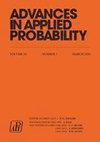连贯的预测会自相矛盾吗?
IF 1.2
4区 数学
Q3 STATISTICS & PROBABILITY
引用次数: 8
摘要
摘要:我们证明了两个获得不同信息的专家(由不同的$\sigma$-域表示)对一个事件的概率给出完全不同的估计的概率的尖锐界。当一个人在一个共同的概率空间中结合来自不同专家的预测来获得一个汇总预测时,这是相关的。明确地描述了绑定的优化器。这篇论文最初的标题是“相互矛盾的预测”。本文章由计算机程序翻译,如有差异,请以英文原文为准。
Can Coherent Predictions be Contradictory?
Abstract We prove the sharp bound for the probability that two experts who have access to different information, represented by different $\sigma$-fields, will give radically different estimates of the probability of an event. This is relevant when one combines predictions from various experts in a common probability space to obtain an aggregated forecast. The optimizer for the bound is explicitly described. This paper was originally titled ‘Contradictory predictions’.
求助全文
通过发布文献求助,成功后即可免费获取论文全文。
去求助
来源期刊

Advances in Applied Probability
数学-统计学与概率论
CiteScore
2.00
自引率
0.00%
发文量
64
审稿时长
6-12 weeks
期刊介绍:
The Advances in Applied Probability has been published by the Applied Probability Trust for over four decades, and is a companion publication to the Journal of Applied Probability. It contains mathematical and scientific papers of interest to applied probabilists, with emphasis on applications in a broad spectrum of disciplines, including the biosciences, operations research, telecommunications, computer science, engineering, epidemiology, financial mathematics, the physical and social sciences, and any field where stochastic modeling is used.
A submission to Applied Probability represents a submission that may, at the Editor-in-Chief’s discretion, appear in either the Journal of Applied Probability or the Advances in Applied Probability. Typically, shorter papers appear in the Journal, with longer contributions appearing in the Advances.
 求助内容:
求助内容: 应助结果提醒方式:
应助结果提醒方式:


